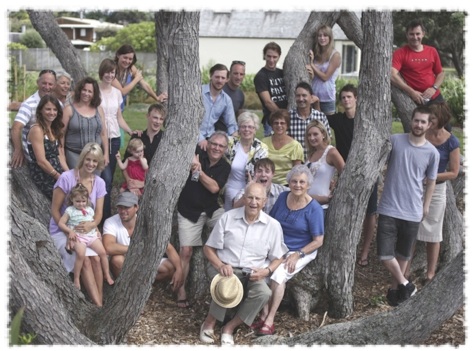
The future of the family
Hands up everybody who has aunts, uncles and cousins. According to author George Weigel, only a minority of Italians will be able to raise their hands in the future. And that in the land of La Famiglia!
Weigel, best-known for his thought-provoking book on Europe, ‘The Cube and the Cathedral’, predicts that by 2050, 60 percent of Italians will not know from personal experience what a brother, a sister, an aunt, an uncle, or a cousin is. ‘Because that’s what you get when, over three or four generations, you have the children of one-child families marrying each other and having one child,’ he argues.
This is just one of several significant consequences of the enormous changes happening to the family landscape in Europe in our time.
Over the last few days, Romkje and I have been meeting in Budapest with others from across Europe committed to strengthening marriages and families. One of the resources we looked at was the OECD report, The future of families to 2030.
The extended family has all but disappeared in many places, according to this report, and the traditional family–the married couple with children–is much less widespread than it used to be.
Factors contributing to this massive and historic shift include rising divorce rates, increased numbers of cohabiting couples and couples ‘living together apart’, single parenthood and same-sex partnerships.
Many more women are pursuing careers or simply working to make ends meet in an economy where one-income families struggle. Adolescents spend longer in education. Elderly family members live longer and, frequently, alone.
Reconfiguration
None of these factors come as a surprise, but they force the question, are we witnessing the fragmentation of the family? Not quite, the report answers. What we are seeing is a reconfiguration of family relations on new foundations.
Networks of ‘mix-and-match’ families, loosely connected family members from different marriages, partnerships and generations are emerging with different attitudes to cohesion and solidarity.
Technological developments including mobile phones, Facebook, Twitter and Skype have created new ways for easy and frequent connections among family members, despite families being much more geographically spread than previously.
Medical progress has improved the health and reduced the dependence of the elderly on other family members, observes the report.
Challenging
So what are the consequences of all these changes in the landscape? The OECD concludes that the next couple of decades are going to be pretty challenging for families and policy-makers alike.
Increased numbers of single-person households will put greater pressure on housing and will face a higher risk of poverty. Cohabiting couples, divorce rates, remarriages and stepfamilies, along with childless couple households, may weaken family cohesion, undermining the capacity for informal family care.
When the traditional family tree begins to resemble a wild bramble bush, ties become confusing and less committed.
A recent title What to expect when no-one’s expecting raises the question of long term consequences of birth rates lower than the 2.1 necessary for maintaining population figures. For some reason, despite all the lip-service given to sustainability, not much attention is being given to relational sustainability, or the role extended families and committed marriages can play in giving our children and grandchildren a future.
Putting all the above in the context of the crises facing Europe we have addressed in recent weekly words–economic, political, social, religious and environmental–there will only be increasing demand for ministries to meet the increased poverty, loneliness and social dislocation these changes are precipitating.
The State of Europe Forum in Dublin, May 9 & 10, is one of the few opportunities I know of for a pan-European dialogue among believers on today’s realities that are forcing to rethink the way we do mission.
Shouldn’t you be joining us there?
Till next week,
Jeff Fountain

This Post Has 0 Comments